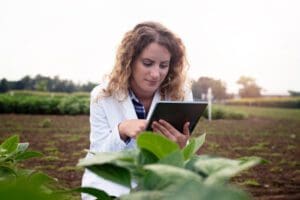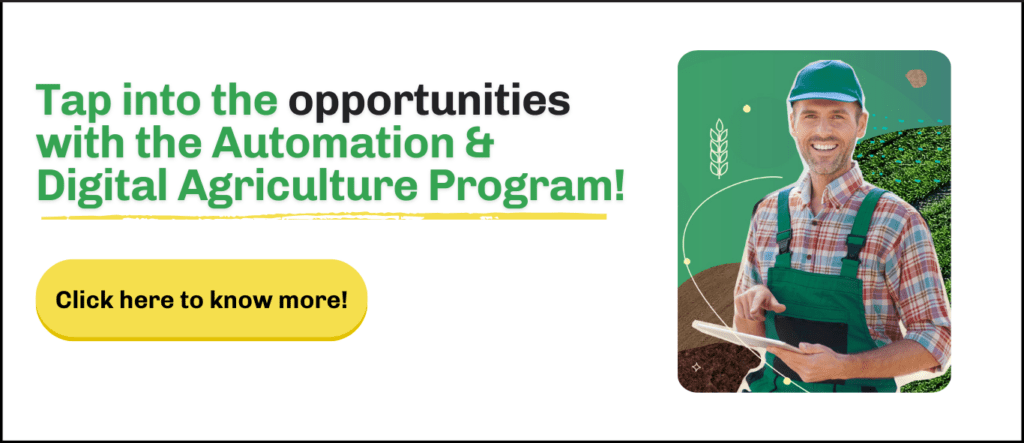Streaming success
When Palette Skills launched its path-breaking Programme de spécialisation en automatisation et agriculture numérique two years ago, we knew there was a need for a program that could rapidly upskill talent to meet the needs of employers struggling to find the right people. Canada’s agricultural landscape has been changing in the face of profound technological innovation, and across the country, we were hearing from producers and industry leaders desperate for people able to apply sophisticated technology and digital solutions to agriculture.
After the first highly successful offering of the program, the design team quickly realized that it made sense to offer three different streams that focused on the different specializations employers were looking for. The Industrial, Technical, and Professional specialization is one of those streams.

Hard and soft skills
As you might expect, the Industrial, Technical, and Professional stream emphasizes the technical and professional aspects of the world of digital agriculture. During the 130 hours of training, participants get trained by industry experts with hands-on, project-based learning in emerging technologies such as GIS, IoT, drones, artificial intelligence, robotics, and big data. But at the same time, they get to develop a full suite of professional skills that include things like project management, fundamentals of business development, problem-solving, and team-building.
It’s a great combination that has delivered results for our participants, and for our employer partners. After all, people with great technical skills don’t always have the chance to identify and leverage the critical soft skills they bring—and that so many employers are looking for. That was certainly the case with Rouvay Wilding, who attended the Automation and Digital Agriculture Specialist program in 2023. Rouvay is a highly-skilled agricultural scientist who was looking for a way to change careers, and find a place in Canada’s agtech space.
“Before I started the program,” says Rouvay “I thought that I had very specific skills, and that I might not be able to find a fit. But then I discovered I had a lot of transferable skills that would be beneficial in the sector.”
Growing opportunities in tech
At a fundamental level, the goal of the Industrial, Technical, and Professional stream is to rapidly upskill professionals who can leverage sophisticated technology and apply it to all the different agricultural processes and systems being developed here in Canada and around the world. So the program provides a comprehensive introduction to precision agriculture, including remote sensing, GPS, and GIS technologies.
Participants get hands-on learning about guidance systems, variable rate, and auto-steer techniques that help farmers and businesses maximize yields while minimizing resources. And with the curriculum also covering such areas as farming best practices, the agricultural supply chain, data management and mapping skills, participants will emerge from the program ready to tackle a range of different challenges and opportunities in agricultural technology.

Let’s hone your skills
Professionals in this stream are the kinds of people who will be able to identify and leverage technology by applying it to agricultural processes and systems. They’ll be working with advanced machinery, precision agriculture tools, automation technologies, and other cutting-edge solutions to enhance productivity, efficiency, and sustainability in farming operations. The program gives you the chance to build and identify your skills, and will guide you as you develop them for a new career.
You might already have some of the skills and aptitudes that make you a great candidate for the Industrial, Technical, and Professional stream. Perhaps you have some knowledge of design, fabrication, operation, and maintenance of machinery and equipment. Or maybe you come with a familiarity with robotic systems and automation, or an understanding of data collection devices. Other great skills for this stream include the ability to troubleshoot technical issues and perform basic repairs, expertise in engineering principles and practices, the ability to interpret technical drawings and specifications, and proficiency with engineering software and tools.
In addition to all this, participants can expect to develop a range of critical professional and soft skills that include things like leadership, communication, teamwork, and people management.
Get to know the field
The range of businesses and enterprises working on the technical side of digital agriculture is vast, and might surprise you. All of the different activities that these and other businesses engage in require people who can manage technology and understand where the opportunities are.
– Agricultural machinery and equipment manufacturers specialize in designing, manufacturing, and selling machinery and equipment. More and more, these businesses are focusing on developing advanced technologies for precision agriculture, automation, and mechanization.
– Technology providers develop and offer innovative technologies for monitoring, sensing, and controlling agricultural operations. This includes companies involved in drone technology, remote sensing, the Internet of Things (IoT) devices, and farm management software.
– Engineering and consulting firms provide engineering and consulting services to the agricultural industry. They offer expertise in areas such as agricultural infrastructure design, irrigation systems, automation solutions, and facility planning.
– Agtech startups are jumping into the field to take advantage of the opportunities. Many new startups are focused on developing and implementing cutting-edge agricultural technologies, such as robotics, artificial intelligence, and automation.
– Farm management software companies develop software solutions specifically designed for managing farm operations, including crop planning, inventory management, financial tracking, and record keeping.
– Precision agriculture service providers offer services such as satellite imagery analysis, drone surveys, soil sampling, and precision application of inputs to optimize farm practices and increase productivity.
– Agricultural robotics companies develop robotics and automation technologies for agricultural tasks, such as harvesting, planting, spraying, and crop monitoring.
– Supply chain and logistics companies specialize in efficient supply chain management and logistics solutions that rely on sophisticated technologies and real time data.
– Energy companies are bringing renewable energy solutions to all kinds of agricultural operations, including low carbon solar and wind energy.
– Environmental services providers are helping producers and industry by identifying environmental and sustainability solutions for a wide range of agricultural practices.
Get started on your new career with the Automation and Digital Agriculture Specialist program from Palette Skills!
Find out how you can jumpstart your new career on the technical side of digital and precision agriculture by checking out the Programme de spécialisation en automatisation et agriculture numérique, view the course schedule here, or find out about the next information session here!








